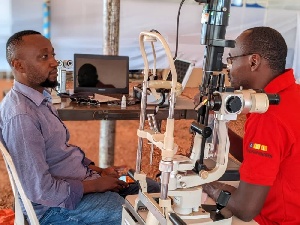- Home - News
- Elections 2024
- News Archive
- Crime & Punishment
- Politics
- Regional
- Editorial
- Health
- Ghanaians Abroad
- Tabloid
- Africa
- Religion
- Photo Archives
- Press Release
General News of Monday, 7 April 2025
Source: www.ghanawebbers.com
Interior Ministry explains why Ghanaian illegal miners are prosecuted while foreigners are deported
The Ministry of the Interior has explained the government's decision to deport foreign nationals involved in illegal mining. This approach is preferred over prosecution in Ghana.
The Ministry cites judicial delays and national security concerns as reasons for this decision. They aim for more effective enforcement against illegal activities.
Since Muntaka Mohammed Mubarak became Minister for the Interior, over 100 foreign nationals have been deported. This includes many Chinese citizens involved in illegal mining, known as galamsey.
A source at the Ministry, who wished to remain anonymous, clarified that the deportation policy is not lenient towards foreigners. It aims to prevent abuse of Ghana’s legal system and protect national interests.
“Foreigners arrested for illegal mining often exploit judicial loopholes,” the source said. They build connections within security services and choose favorable courts for bail. Once released, they move to other districts and continue their illegal activities while court cases drag on.
To combat this issue, the Ministry collaborates with embassies of offenders to facilitate deportations. The embassies usually pay for the deportees’ flights. Meanwhile, Ghana covers travel costs for Immigration Service officers who escort them home.
Upon arrival in their countries, deported individuals are handed over to local law enforcement agencies for prosecution. Ghana's foreign missions monitor these legal proceedings closely and provide updates to the Interior Ministry.
The Ministry also stated that Ghanaian accomplices aiding foreign nationals will face legal action and prosecution as well. Recently, 30 passengers were handed over to Chinese Immigration Officers at the airport.
According to the source, China fully supports Ghana’s actions against illegal mining by its nationals. They view this involvement as a disgrace that threatens diplomatic relations between both nations.
The Interior Ministry believes this strategy promotes timely justice and reduces security threats. It also strengthens international cooperation against transnational crime.











